Texas Hold’em Poker
Master the Game: Your Guide to Texas Hold’em Poker
If you’re looking to dive into the world of poker, you’ve come to the right place. Texas Hold’em isn’t just a card game; it’s a global phenomenon and the undisputed king of poker variants. Its blend of strategy, psychology, and chance has captivated players everywhere, from casual home games to the multi-million dollar spotlight of the World Series of Poker.
So, how do you play? It’s simpler than you might think, but mastering it is a lifelong pursuit.
The action starts with a standard 52-card deck. Each player receives two private cards, known as «hole cards,» dealt face down. These are your secret weapons, the foundation of your hand that only you can see.
The real drama unfolds across four rounds of betting as five shared «community cards» are slowly revealed in the center of the table for everyone to use. This is where the strategy kicks into high gear.
Here’s how the dealing works:
The Flop: After the first round of betting, the dealer reveals the first three community cards.
The Turn: Following another betting round, a fourth card is dealt.
The River: After more betting, the fifth and final community card is placed on the table.
Your mission is to craft the most powerful five-card hand possible by combining your two private hole cards with any of the five community cards on the board. You can use both, one, or even none of your hole cards to make your best hand (this is called «playing the board»).
When the final bets are in and the last card is revealed, all remaining players reveal their hole cards. The player who can create the highest-ranking five-card poker hand takes the pot. It’s a thrilling showdown of nerves, bluffing, and sheer calculation.
Whether you’re a complete beginner learning the hand rankings or a seasoned vet reading your opponents, Texas Hold’em offers endless depth and excitement. Ready to ante up?
Texas Holdem Poker Online Real Money: The Ultimate Guide to Winning in 2025
The flick of the cards, the tension of a big bluff, the thrill of a rivered flush—this is the magic of poker. For decades, Texas Hold’em has reigned supreme as the world’s most popular card game. But you no longer need a invite to a smoky backroom or a trip to Las Vegas to experience its thrill. The digital era has brought the game to our fingertips, offering the chance to play Texas Holdem poker online real money games from the comfort of your home.
If you’re curious about stepping into this exciting world but aren’t sure where to start, you’ve come to the right place. This comprehensive guide is your all-access pass. We’ll walk you through everything from choosing a safe and reputable site to understanding the core strategies that will help you protect your bankroll and build your stack. Let’s dive in.
Why Play Texas Hold’em for Real Money Online?
Playing for fun is one thing, but playing Texas Holdem poker online real money adds a layer of excitement and stakes that free-play games simply can’t match. It transforms the game from a casual pastime into a skillful endeavor where your decisions have tangible consequences.
The Ultimate Convenience: The closest poker table is now in your pocket. Play on your desktop, laptop, or mobile device anytime, anywhere. Whether you have five minutes for a quick spin-and-go or an afternoon for a deep-run tournament, the games are always running.
A Game for Every Player: Online platforms cater to every budget. You can find micro-stakes cash games where you can buy in for just a few dollars, all the way up to high-stakes tables where the pots are life-changing. This accessibility allows you to start small and grind your way up as your skills and confidence improve.
Sharpen Your Skills: The volume of hands you can play online is exponentially higher than in a live game. This rapid-fire experience is an incredible training ground. You’ll see more situations, learn to calculate odds faster, and develop your instincts against a wide array of player types.
Your First Steps: Choosing a Safe and Secure Platform
Before you even think about strategy, the most critical decision is where to play. Your safety and the security of your funds are non-negotiable. Here’s what to look for in a top-tier real money poker site:
Licensing and Regulation: Only play on sites licensed by reputable gaming authorities like the Malta Gaming Authority (MGA), the UK Gambling Commission (UKGC), or a recognized state regulator in the US (like in New Jersey, Pennsylvania, or Michigan). This ensures the platform operates under strict guidelines for fairness and player protection.
Software and Game Integrity: Look for sites that use certified Random Number Generators (RNGs). This independent certification guarantees that every card dealt is completely random, ensuring a fair game for everyone.
Secure Banking Options: A good site will offer a variety of trusted deposit and withdrawal methods. Look for options like credit/debit cards, e-wallets (PayPal, Skrill, Neteller), and bank transfers. SSL encryption should be standard to protect your financial data.
Player Traffic and Game Selection: A healthy site has plenty of active players. This means you can always find a game at your preferred stake level, whether it’s No-Limit Hold’em cash games, multi-table tournaments, or sit-and-gos.
Welcome Bonuses and Promotions: Most sites offer a welcome bonus to new players, often matching a percentage of your first deposit. While these are great for boosting your starting bankroll, always read the Terms and Conditions to understand the wagering requirements.
The Nuts and Bolts: How to Play Texas Hold’em Online for Cash
The rules of Texas Hold’em are identical online and offline. Each player receives two private cards (hole cards), and five community cards are dealt face-up in the center of the table. Your mission is to make the best possible five-card hand using any combination of your two hole cards and the five community cards.
The action unfolds over four betting rounds:
Pre-flop: After receiving your hole cards, the first round of betting begins with the players in the blinds.
The Flop: The dealer reveals the first three community cards. A second round of betting follows.
The Turn: The fourth community card is dealt, followed by a third betting round.
The River: The fifth and final community card is revealed, leading to the final round of betting.
If more than one player remains after the final bet, a showdown occurs. The player with the highest-ranking five-card hand wins the pot.
Beyond the Basics: Core Strategy for Winning Real Money
Anyone can learn the rules, but winning consistently requires strategy. Here are three foundational pillars to build your game upon.
1. Start Tight, Play Position
When you’re new, the simplest way to improve is to play fewer hands. Only enter pots with strong starting hands (like high pairs, AK, AQ). This immediately prevents you from bleeding chips with weak cards.
Equally important is understanding position. The player who acts last (closest to the dealer button) has a significant strategic advantage because they get to see what everyone else does before they act. Play more hands from late position and fewer from early position.
2. Master the Art of Betting
Betting isn’t just about the size of your hand; it’s about telling a story.
Value Betting: When you have a strong hand, you bet to get called by worse hands. This is how you build big pots.
Bluffing: Sometimes, you bet to get better hands to fold. Successful bluffs tell a believable story based on the community cards.
Pot Odds: This is a crucial mathematical concept. Simply put, it’s the ratio of the current size of the pot to the cost of a call you must make. If the pot is $100 and you need to call $10, your odds are 10-to-1. If your odds of winning the hand are better than that, it’s a mathematically correct call in the long run.
3. Bankroll Management: Your Shield Against Tilt
This is the most important strategy for any aspiring poker player. Bankroll management (BRM) is the practice of only playing at stake levels your total funds can support.
A common rule for cash games is to have at least 20-30 buy-ins for the level you’re playing. So, if you’re playing $0.50/$1.00 NLH, where a standard buy-in is $100, you should have a bankroll of $2,000-$3,000. For tournaments, a common rule is 100 buy-ins.
This isn’t about getting rich quick; it’s about insulating yourself from the inevitable short-term swings of variance (bad luck). It allows you to make calm, rational decisions without the fear of going broke on a single bad beat.
Getting Started: Your First Hand
Ready to take the plunge? The process is simple.
Choose a Site: Pick a licensed, secure platform from your region.
Create an Account: Provide the required details for verification (KYC process).
Make a Deposit: Claim your welcome bonus and fund your account using a secure method.
Find a Table: Head to the lobby and filter for low-stakes cash games or small buy-in tournaments. The «beginner» or «low» tables are a perfect place to start.
Play! Observe the action, take your time with decisions, and remember the strategies you’ve learned.
Play Smart, Play Safe
The world of Texas Holdem poker online real money is thrilling, competitive, and potentially rewarding. Embrace the learning process. Use the vast resources available—from training sites to hand history reviews—to continuously improve.
Most importantly, always prioritize responsible gaming. Set deposit limits, take breaks, and never chase losses. Poker is a marathon, not a sprint. Good luck at the tables
No Limit
No Limit Hold'em: Where Every Move Can Be Your Last
Forget the gentle nudges of fixed betting. At 7XL, we play Texas Hold'em the way it was meant to be played: raw, unpredictable, and utterly thrilling. Every game on our platform is No Limit Hold'em.
What does "No Limit" truly mean for you? It means the power is entirely in your hands. There is no ceiling, no cap on the size of your ambition when it's your turn to act. If you believe in your hand, you can push every single chip you have into the middle of the virtual felt in one breathtaking move. This is the iconic "all-in" bet.
This rule changes everything. It transforms every hand into a high-stakes drama where courage is just as important as your cards. A single bold move can pressure an opponent into folding a better hand or set you up to double your stack and dominate the table. It's the heart of the high-risk, high-reward strategy that makes poker so electrifying.
In 7XL's No Limit games, you're not just betting chips—you're betting your conviction. So, are you ready to go all-in?
Positions
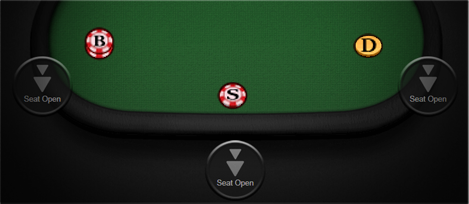
The Heart of the Action: Understanding Blinds and the Dealer
Ever sat down at a poker table and heard terms like "big blind" or "dealer button" and felt a little lost? Don't worry, it's simpler than it sounds. These aren't just random positions; they're the engine of the game that force the action and create every pot. Let's break down who does what and why it matters.
The Dealer (The Button)
Think of the dealer position, marked by a circular "button" on the table, as the prime spot. The player "on the button" acts last in every betting round after the flop, which is a massive strategic advantage. They get to see what everyone else does before making their move. But here's the key: this isn't a job for one person. Since casinos and online platforms have a dedicated dealer, the button is just a symbolic position that rotates clockwise to the next player after each hand. This ensures everyone gets a fair turn at the best seat at the table.
The Small Blind
Sitting immediately to the left of the dealer, this player has to post the small blind. This is a forced bet, usually half the size of the minimum bet (e.g., $0.50 in a $1/$2 game), that seeds the pot before any cards are even dealt. Because they've already put money in, the small blind acts second-to-last before the flop.
The Big Blind
Next up is the player to the left of the small blind. They have to post the big blind, which is a full minimum bet (e.g., $1 in a $1/$2 game). This sets the baseline stake for the game. The big blind is a live bet, meaning when the action gets back to them on the first round, they can choose to raise, call, or fold. Just like the dealer button, the small and big blind positions rotate around the table with each new hand, so everyone shares the burden of these forced bets.
Why does this all matter? These rotating forced bets are what get the money flowing. They create an immediate pot to fight for, ensuring every hand has action from the very start. Without blinds, the game would stall—players could just wait forever for perfect cards. The blinds force the game to move, creating the drama and strategy we all love.
Actions
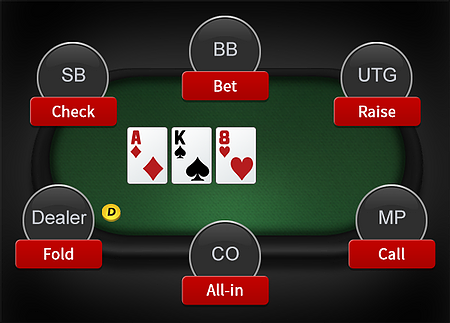
Your Poker Toolkit: Mastering the Moves of Texas Hold'em
Poker is a language of its own. To play well, you need to know the vocabulary of action. These aren't just buttons to click; they're strategic tools you use to tell a story, pressure your opponents, and protect your stack. Let's break down your options when it's your turn to act.
Check
What it is: Passing the action to the next player without putting any money in the pot. You can only do this if no one before you has made a bet during that round.
The Strategy: While checking can mean you're waiting for a better card, don't fall into the trap of always associating it with a weak hand. Savvy players often "check" with strong hands, a move known as a "check-raise," to trap aggressive opponents into betting.
Bet
What it is: You’re the first to put money into the pot during a betting round.
The Strategy: Betting is how you build a pot when you believe you have the best hand. It's also a powerful tool to win the pot immediately if you can get everyone else to fold. The size of your bet sends a message—are you fishing for information or going for value?
Raise
What it is: Increasing the size of the current bet. If someone bets $5, you can raise it to $15 or more.
The Strategy: A raise is a declaration of strength. It forces everyone after you to pay more to see the next card or to fold. You raise for two main reasons: to get more money into the pot with a powerful hand, or to bluff and represent a hand you don't have, making others surrender.
Call
What it is: Matching the current bet to stay in the hand.
The Strategy: Calling is how you see the next card without escalating the conflict. While it can seem passive, it's a vital part of the game. Remember, not every bet is a sign of strength. Sometimes, calling is the correct, cautious move to keep an opponent honest and see if their story holds up on the next card.
All-In
What it is: Pushing every single chip you have into the middle. This is the ultimate move.
The Strategy: Going all-in is the maximum amount of pressure you can apply. It forces opponents to risk their entire stack to call you. Use it to protect a monster hand or to make a daring bluff when you sense weakness. It's a high-risk, high-reward play that can change the entire dynamic of a game.
Fold
What it is: Discarding your hand and sitting out for the remainder of the hand. You surrender any claim to the pot.
The Strategy: Folding isn't quitting; it's smart bankroll management. The ability to fold a decent-but-losing hand is what separates pros from amateurs. If the odds are against you or the price to see the next card is too high, saving your chips for a better battle is often the most powerful move you can make.
Betting Rounds
There are four betting rounds in Texas Hold’em.
Pre-Flop
The betting round that takes place after the players receive their hole cards.

The-Flop
The betting round that takes place after the first three community cards are dealt.

The Turn
The third betting round that takes place after the fourth community card is dealt.

The River
The last betting round that takes place after the fifth and final community card is dealt.

The Showdown
The Showdown: How a Poker Hand is Won (or Split)
After the final bet is called on the river and the last card is revealed, the tension at the table reaches its peak. This moment is known as the showdown—the grand reveal where players lay their cards on the table to determine a winner.
A showdown is triggered one simple way: if two or more players are still in the hand after the final round of betting concludes. If everyone else folds to a single bettor, that player wins the pot without ever having to show their cards. But if there are callers, it's time for the cards to speak.
Here’s how it works:
The Winning Hand
The player who made the last aggressive action (like betting or raising) on the river is the first to show their cards. If there was no bet on the final round, the player to the immediate left of the dealer shows first. This process continues clockwise around the table. The fundamental rule is simple: the player with the highest-ranking five-card hand, made from any combination of their two hole cards and the five community cards, wins the entire pot.
The Tie Game: Splitting the Pot
Poker is a game of fine margins, and sometimes the best you can do is tie. This happens when two or more players have hands of identical strength after all cards are revealed.
A classic example is when the five community cards are so strong that they form the best possible hand for everyone (e.g., a board of A♠ K♠ Q♠ J♠ 10♠ makes a straight flush for every player, regardless of their hole cards). Another common tie is when players have the same pair or two pair, with the same "kicker" card.
When this happens, the pot is split evenly among all the winning players. Any odd chips are usually awarded to the player in the most advantageous position (closest to the left of the dealer).
The showdown is the ultimate arbitrator in poker. It’s where bluffs are exposed, lucky draws are rewarded, and the best hand truly does win. Knowing how it works is the final, crucial step in understanding the flow of every hand.

9-Max Table
Spicing Up the Game: Understanding Antes in 9-Handed Hold'em
While the classic structure of Texas Hold'em is built around blinds, you might occasionally find yourself at a table with an extra twist: a mandatory ante. This rule variation is common in tournaments and is sometimes used in cash games to amp up the action.
In these specific 9-handed Hold'em games, the dynamic shifts right from the very first deal. Before any cards are even dealt, every single player at the table must contribute a forced bet known as an ante. Think of it as a table-wide entry fee for the hand.
How does it work?
The amount of this ante is typically standardized to be equal to one small blind. So, if you're playing in a game with $1/$2 blinds, the ante for every player would be $1. This happens automatically; the software or dealer will collect this amount from each player's stack as the hand begins.
Why Add an Ante?
The primary purpose of the ante is to inject more money into the pot before the first card is dealt. A larger starting pot creates immediate incentive for players to fight for it, encouraging more action and fewer players folding pre-flop. It makes the game more aggressive and exciting.
What Happens Next?
Once the antes are posted and the hole cards are dealt, the game proceeds exactly as you'd expect in any other Hold'em game. The player in the small blind and big blind positions still post their mandatory bets, and the first pre-flop betting round begins with the player to the left of the big blind.
So, while the ante adds an initial layer of cost, the core flow of the hand—the pre-flop, flop, turn, and river betting rounds—remains completely unchanged. You're still playing the same strategic game, just with a slightly bigger pot to win right from the start.
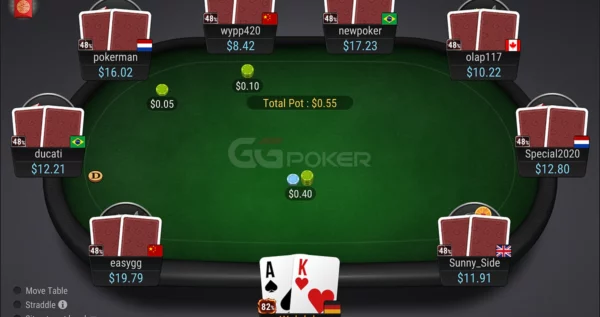
Play Money
Getting Started with Play Money: Your Risk-Free Poker Playground
New to poker or just looking to practice your strategy without any pressure? Our Play Money tables are the perfect place to get a feel for the game. Think of it as a virtual poker lab where you can experiment, learn, and have fun without ever risking a dime.
What Exactly is Play Money (P)?
Play Money (P) is a free currency of chips used exclusively at our designated Play Money tables. You can spot these tables easily because the blinds are clearly marked with a 'P' (for example, 10P/20P). These chips are provided for entertainment and educational purposes only.
Where Can You Use Play Money?
We offer a wide variety of Play Money games to suit every taste, including:
Texas Hold'em: The world's most popular poker variant.
Pot-Limit Omaha (PLO) & PLO-5: Action-packed games for those who love more hole cards.
Short Deck (6+ Hold'em): A fast-paced game where all the low cards are removed.
All-In or Fold: The ultra-fast format where every decision is all-or-nothing.
Spin & Gold: Quick, jackpot-style tournaments that start in seconds.
Rush & Cash: Our signature fast-fold poker where you get a new hand immediately after folding.
How to Get and Replenish Your Play Money Chips
We want you to keep playing, so we provide regular top-ups:
New Players: Welcome! To get you started, you'll receive a bonus of P20,000 immediately after signing up.
Existing Players: You can claim a recharge of up to P10,000 every four hours, with a maximum of two claims per day. This ensures you always have chips to jump back into the action.
Important Things to Remember
Before you hit the tables, please keep a few key rules in mind:
No Cash Value: Play Money chips are for fun only. They cannot be redeemed for cash, transferred, or combined with any real-money currencies like cash, C$, or T$.
Feature Limitations: Some advanced features available in real-money games might not be active on Play Money tables.
Eligibility: Access to our Play Money tables is subject to the terms, conditions, and gaming regulations of your specific jurisdiction.
So, grab your free chips and dive in. It’s the best way to learn the ropes, test new strategies, and enjoy the thrill of poker completely risk-free!
6MAX
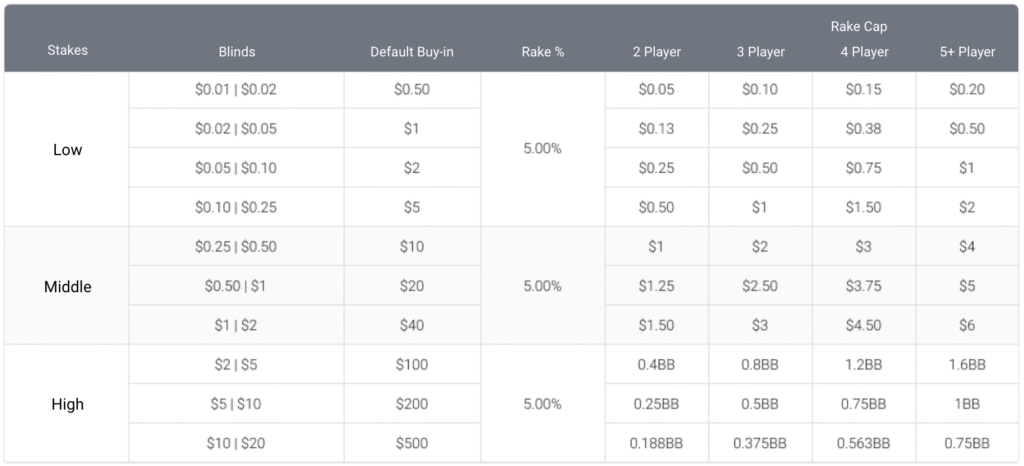
9MAX
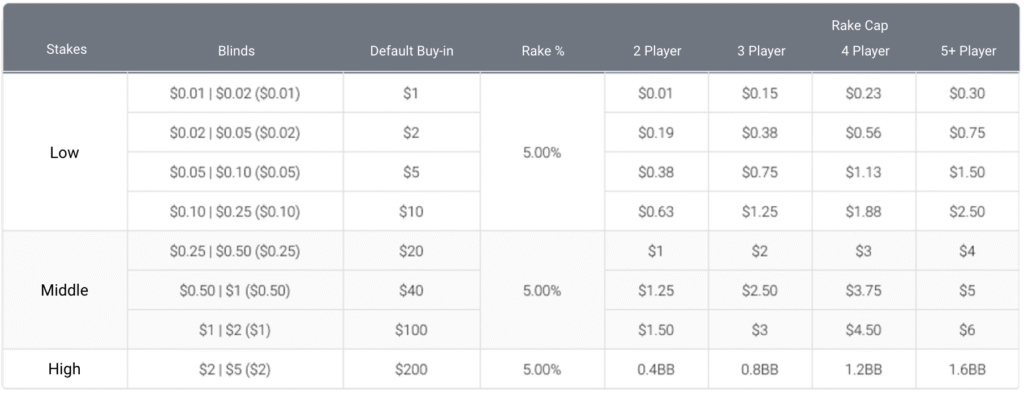
Play Money

Bad Beat Jackpot
Bad Beat Jackpot will turn your worst moments into your best!
A “Bad Beat” is when you lose with a great hand to an even better one.
Bad Beat Jackpot occurs when you lose with one of the following hands.
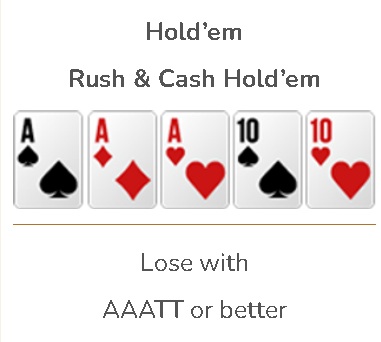
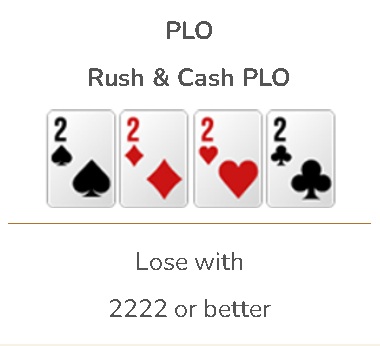
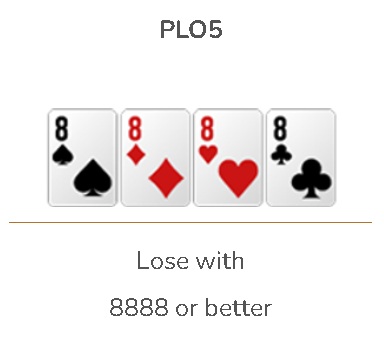
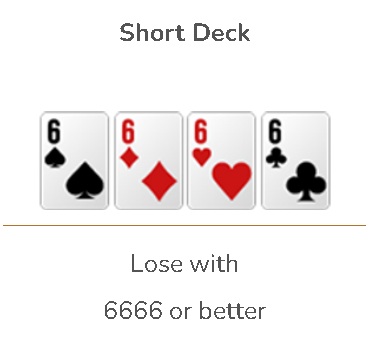
Hitting the Jackpot
Chasing the Dream: Your Guide to the Bad Beat Jackpot
Every poker player dreams of that legendary, story-making hand. While winning a big pot is great, there's something even more electrifying: hitting the Bad Beat Jackpot. This is poker's ultimate consolation prize—a massive, often life-changing payout that rewards you for suffering an unbelievably unlucky beat.
But how do you actually win it? The rules are specific, so let's break down exactly what needs to happen for the jackpot to trigger.
The Golden Rules: How to Trigger the Jackpot
It’s not enough to just have a strong hand. To qualify for the Bad Beat Jackpot, a very specific and rare sequence of events must occur:
The Hand Must Go to Showdown. This is non-negotiable. The jackpot can only be awarded if all the cards are revealed. If everyone folds to your incredible hand, the jackpot cannot be won.
Both Hole Cards Must Play. Both the player who wins the pot and the player who loses with the qualifying "bad beat" hand must use both of their hole cards to make their best five-card hand. You can't just use one of your cards and four from the board; both of your private cards have to be essential to creating that monster hand.
Pocket Pairs are Required for Quads. This is a crucial detail for Four of a Kind hands. If the losing hand is four-of-a-kind, it must be made using a pocket pair in their hole cards. For example, if the board is 9♦9♠9♥2♣2♥, a player holding 9♣2♦ would qualify (they have a full house, 9s over 2s), but a player holding A♣K♣ would not—they are just playing the board for a full house. Similarly, for quads, a player must hold a pocket pair that matches two of the board's cards.
Important Fine Print to Know
Running It Multiple Times (RIT): If players agree to "run it twice" (or more), only the very first run is eligible for the jackpot. Any subsequent runs do not count, even if the same incredible hands appear again.
You Can't Run From Fate: The best news? Once the jackpot conditions are met and the hand is confirmed, the reward is locked in. If your internet disconnects, you leave the table immediately, or even if you're still in shock—you will still receive your share of the prize. The system has already recorded the historic hand.
Hitting the Bad Beat Jackpot is a rare event that becomes a part of poker room lore. It turns a moment of brutal luck into a celebrated win for everyone at the table. So next time you suffer a soul-crushing beat, remember—it might just be your lucky day.
Jackpot Payout
All blinds share the same jackpot payout percentage, despite the jackpot being allocated differently for each blind.
Jackpot payout percentage is as shown in the table below.
Payouts

Your Guide to the Bad Beat Jackpot: Payouts, Rules, and Rare Scenarios
So, you've witnessed—or perhaps even been part of—that legendary hand where an unbeatable hand actually gets beaten. The kind of hand that makes the Bad Beat Jackpot hit. But what happens next? How are prizes actually awarded, and what rules apply in special situations? Here’s everything you need to know in plain language.
How Payouts Work: Instant and Secure
Once a Bad Beat Jackpot is triggered and officially verified, the prize money is automatically credited directly to your wallet. There’s no need to submit a request or wait for manual processing. The system handles it instantly, so you can focus on celebrating (or recovering from the shock!).
Protection Against Disconnections
We know internet hiccups happen. That’s why we’ve built in player protections:
If you’ve already received your hole cards, you are officially considered an active participant in the hand.
Even if you get disconnected, leave the table, or your hand is folded automatically due to timing out, you will still receive your full share of the jackpot reward—provided all other qualifying conditions were met.
So, rest assured: if fate deals you a winning jackpot hand, you won’t lose out because of connection issues.
Special Case: Rush & Cash Games
In Rush & Cash games, the fast-fold format means players come and go quickly. To keep things fair and exciting:
The Bad Beat Jackpot is still fully active, regardless of how many players are seated at your virtual table when the hand occurs.
Even with constant player rotation, every eligible participant in the triggering hand will receive their portion of the jackpot.
What Happens in a Tie?
It’s rare, but it can happen: two players might have losing hands of identical strength—for example, the same full house using both of their hole cards.
In such cases:
The jackpot prize will be split evenly between those tied players.
For example, if two players both lose with identically ranked full house hands, each would receive 50% of the allocated “losing hand” reward.
This ensures the jackpot is always distributed fairly, even in extremely unusual circumstances.
Remember: The Bad Beat Jackpot isn’t just about the lucky (or unlucky) player who suffered the beat—it often rewards everyone at the table. So even if you’re not directly involved in the showdown, you might still benefit from poker’s most thrilling moment.
Now you know: stay in your seat, play your cards, and maybe—just maybe—you’ll be part of the next big jackpot story.
Jackpot Fund
The Bad Beat Jackpot: How the Prize Pool Grows and Where You Can Find It
Ever watch the Bad Beat Jackpot ticker climb higher and higher and wonder, "Where does all that money actually come from?" You're not alone. The jackpot is one of the most exciting features in our cash games, and it’s funded directly by the action at the tables. Here’s a straightforward breakdown of how it works.
One Giant Prize Pool, Multiple Games
To keep the jackpot substantial and the payouts life-changing, the Bad Beat Jackpot is fed by a shared prize pool across several popular games:
Hold’em
Pot-Limit Omaha (PLO)
PLO-5 (Omaha 5-Card)
Short Deck (6+)
Rush & Cash Hold’em
Rush & Cash PLO
This means that every time you play in one of these games, you’re not just playing for the pot on your table—you’re also helping to build a massive, community-wide jackpot that could be triggered at any moment, in any of these games. The sole purpose of this fund is to pay out those incredible Bad Beat Jackpot wins.
How is the Jackpot Funded? It’s a Team Effort.
The jackpot grows with every sizable pot. A small contribution is taken from eligible pots before the winner receives their payout, and this tiny amount is what fuels the massive jackpot you see ticking upward.
The rules for contributions are simple and vary slightly by game:
For Hold’em, PLO, PLO-5, Rush & Cash Hold’em, and Rush & Cash PLO:
If the final pot is equal to or exceeds 30 big blinds, a contribution equivalent to 1 big blind is taken from the pot and added to the jackpot fund.
What about 3-Blind Tables? In games with three blinds, the math is adjusted for fairness. If the pot hits the 30 big blind threshold, a smaller contribution of 0.4 big blinds is made.
Heads-Up or Short-Handed? If there are 4 or fewer players seated at the table, the game is treated as a standard 2-blind game for jackpot purposes, and the full 1 big blind is contributed from qualifying pots.
For Short Deck:
Short Deck is a faster, action-packed game with different blind structures. Here, a contribution is triggered when the pot equals or exceeds 100 button blinds. When it does, an amount equal to 1 button blind is added to the jackpot fund.
Your Prize is Always Waiting—Just Check the Ticker!
The best part? This system ensures the jackpot is always growing and ready for the next lucky player. You can watch the prize pool grow in real-time!
On PC: Check the live jackpot amount in the main game lobby or directly at your table.
On Mobile: The current jackpot total is prominently displayed in the app’s lobby.
So the next time you’re in a big hand, remember—you’re not just playing for the chips in the middle. You’re helping to build a dream payout for someone at the tables. And who knows? The next time the jackpot hits, it could be your name on the winner’s list.
Bet on Flop
Introducing a New Side Game for Hold’em Cash Tables
Players will be able to win by correctly guessing the upcoming flop results before the flop opens
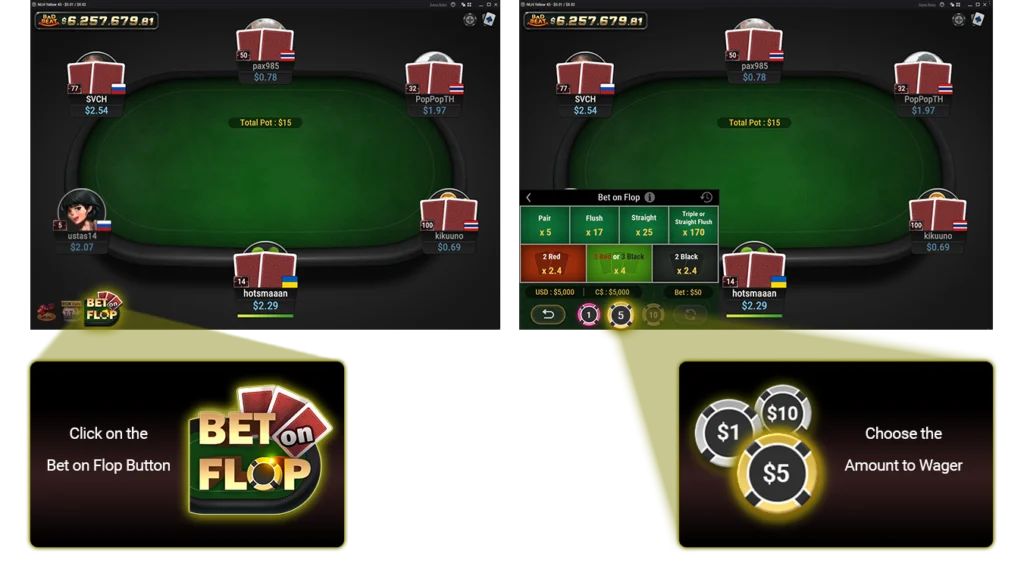
Everything You Need to Know About In-Game Betting
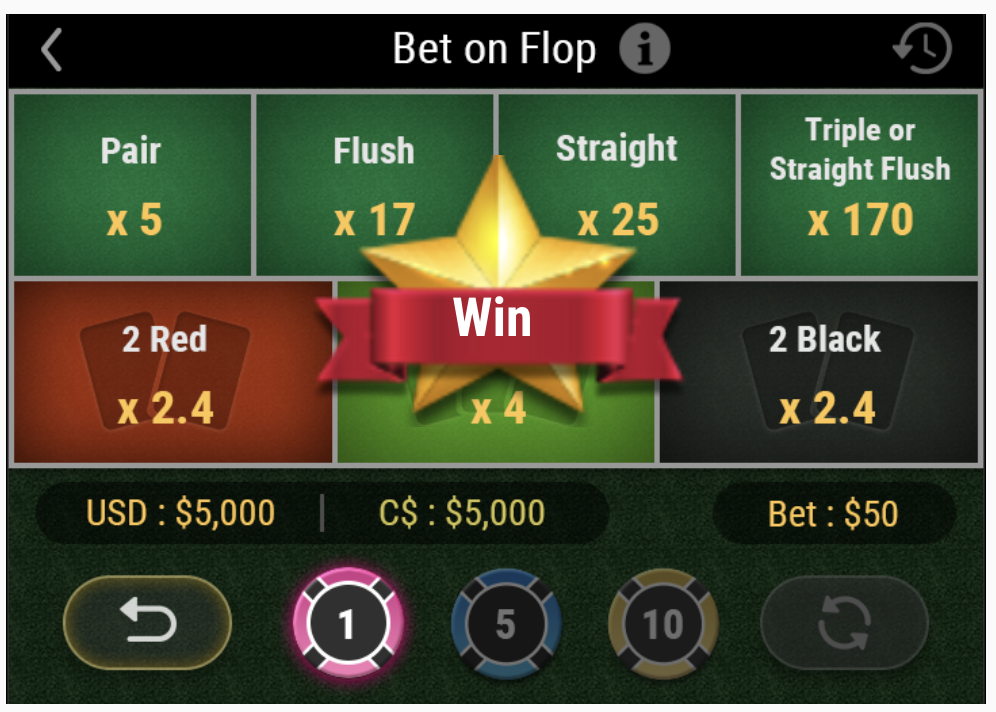
Ever wanted to add an extra layer of excitement to your poker game? Many platforms offer a fun, optional feature that lets you place side bets on the outcome of a hand while you’re playing. It’s a great way to stay engaged even when you’ve folded. But how does it work? Here’s a clear, player-friendly breakdown of the rules.
Who Can Place a Bet?
Only players who are actively dealt into the hand and participating in the pot are eligible to place a side bet. If you’ve folded or are sitting out, you won’t be able to join in on the betting action for that hand.
When Can You Bet?
The betting window is open from the start of the hand until the flop is dealt. Once those three community cards hit the table, all side betting for that hand closes.
What Happens If the Hand Ends Early?
If the hand concludes before the flop (for example, if everyone folds to a big pre-flop raise), any active side bets don’t just disappear. They’ll automatically carry over and apply to the very next hand that begins.
…And If the Next Hand Doesn’t Start?
Sometimes, there’s a delay between hands—maybe several players sit out or leave the table. If the next hand doesn’t begin immediately, any carried-over bets will be canceled, and your wager will be returned to you. This ensures you’re only betting when there’s actual game action.
What Are the Betting Limits?
To keep things fun and fair, side bets have boundaries. You can generally wager anywhere from 1 to 100 big blinds. This range lets you choose a level of risk that you’re comfortable with.
How and When Are Bets Settled?
All bets are settled automatically at the very end of the designated betting period (which is once the flop is revealed). The system will determine the outcome and instantly credit any winnings directly to your account.
Important Things to Keep in Mind
Low Balance? If your account balance becomes too low to cover your intended wager at the moment the bet is to be locked in, your bet may be automatically canceled. It’s always a good idea to ensure you have sufficient funds before placing your bet.
Side bets are a thrilling way to test your predictions and make every hand more engaging. Just remember to bet responsibly and enjoy the added action
Bet on Flop RTP
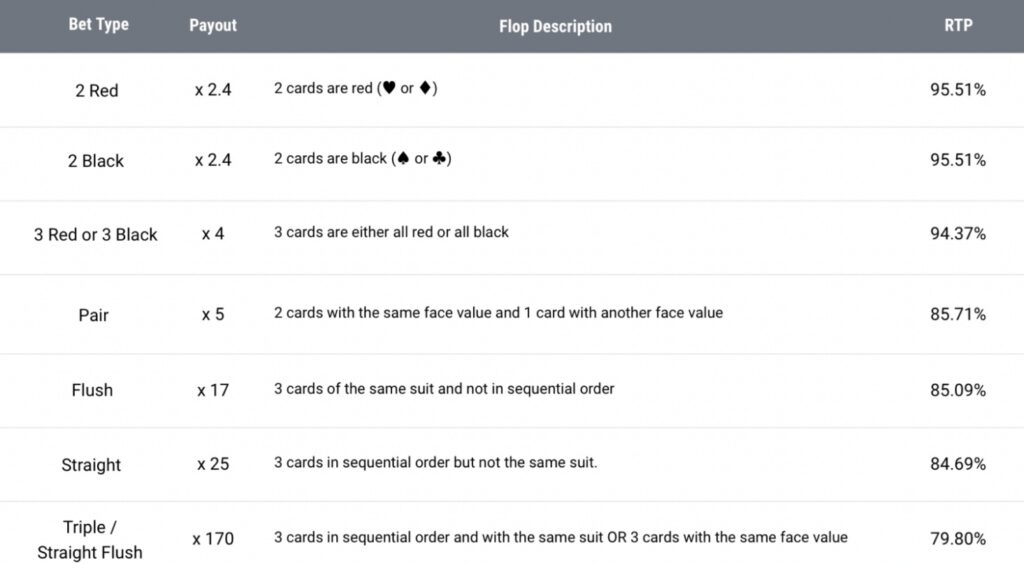
Next Hand Roulette
A new optional side game that is available for
Hold’em Cash game tables.
Players will be able to win by predicting the next hand that will be dealt to the player.
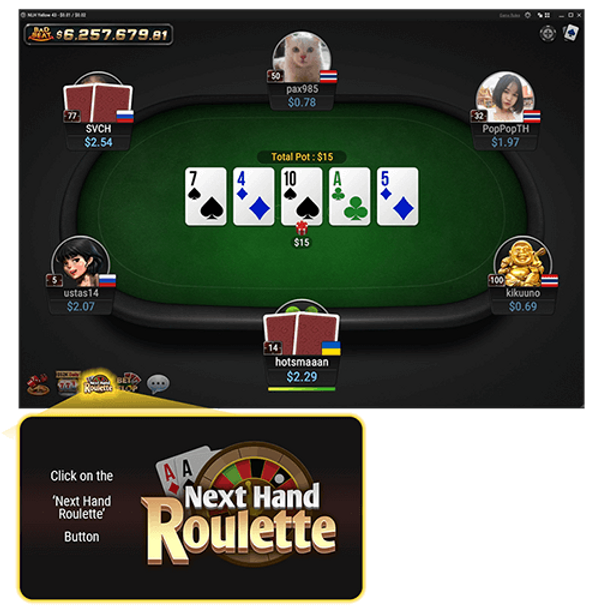
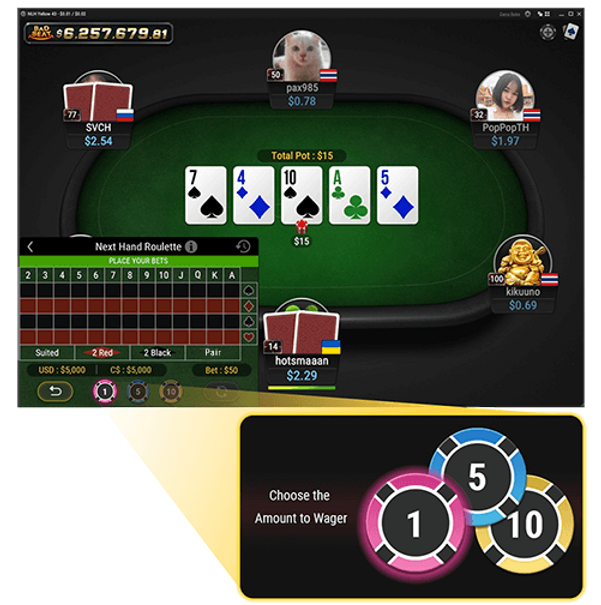
Game Rules
Your Guide to In-Game Betting: How It Works
Placing bets while you play adds an extra layer of excitement to your gaming experience. But before you dive in, it’s important to understand how the system works. Here’s a straightforward breakdown of the rules and features so you can bet with confidence.
Who Can Bet?
Only players actively seated at the table can place bets. If you’re just observing or have left the table, you won’t be able to participate in betting for that hand.
When Can You Bet?
Betting opens as soon as you take your seat and remains available until the next hand is revealed. The betting interface is directly tied to the live action at the table, so you can engage in real-time as the game progresses.
What Happens Between Hands?
If the next hand doesn’t begin immediately—for example, if players are sitting out or the table is waiting for more participants—any active bets will be automatically canceled to ensure fairness.
Types of Bets
You can choose from two main categories of bets:
Inside Bets
Place chips freely on individual numbers, groups of numbers, or colored patterns on the betting grid. These bets often come with higher payouts due to their specific nature.Outside Bets
These are prop bets placed on broader outcomes, such as red/black, odd/even, or specific sections of the betting layout. They typically offer lower payouts but higher odds of winning.
Game-Specific Betting
Betting options and payout rates may vary depending on the game you’re playing. Always check the betting panel to see which items are available for your current table.
Balance Updates and Currency Use
Your balance is updated in real-time when you open the Roulette betting panel and again when your bets are settled.
If your balance is too low to cover a bet, the bet may be canceled.
If you join another buy-in on a different table, any active bets on your current table may also be canceled.
Currency Priority
The system automatically uses your available currencies in the following order:
For Cash Games:
If you buy in with C$ (cash), any bets will use C$ first if available.For Tournaments or Spin & Gold:
If you buy in with T$ (tournament dollars), T$ will be used first.
If you enter using a Ticket, regular dollars ($) will be used first for betting.
Reviewing Your Activity
You can always review your hand history and betting results in your account dashboard. This is a great way to track your performance and refine your strategy.
Now you’re ready to make the most of the betting feature! Remember to play responsibly and enjoy the thrill of the game.
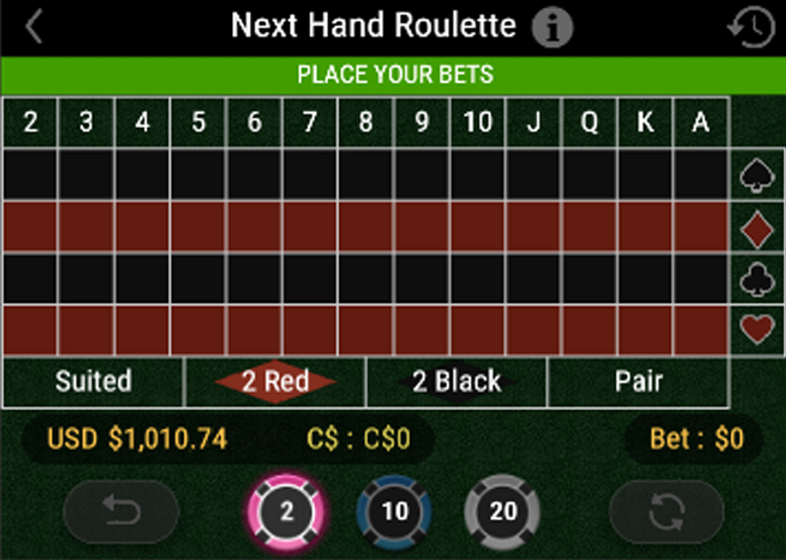
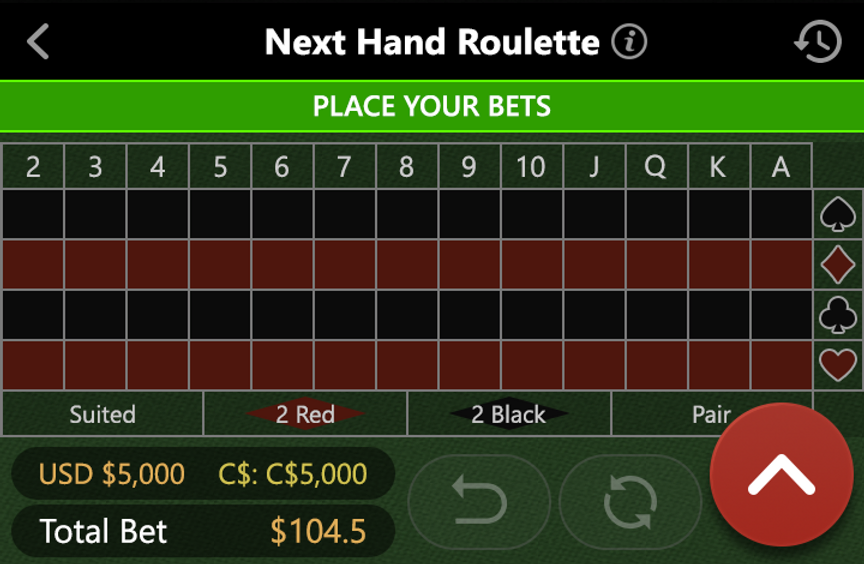
Hold’em RTP
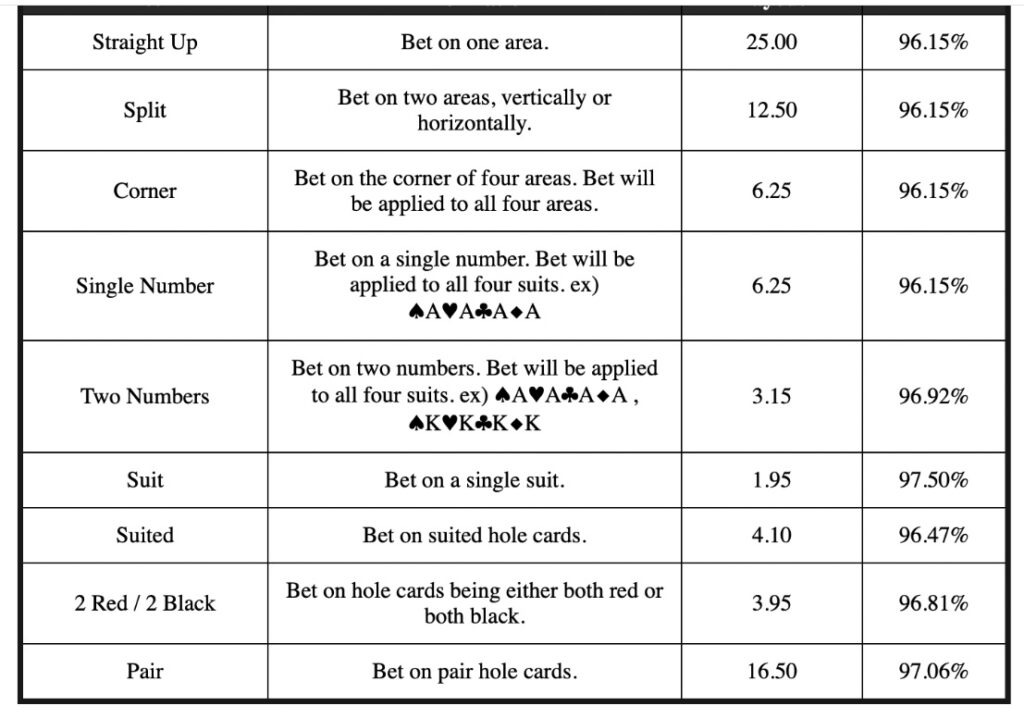
Hold’em Info
A Player’s Guide to Table Rules & Features
Whether you’re just getting started or looking to brush up on the specifics, understanding the rules and structure of your poker table is key to a smooth and enjoyable experience. Here’s a clear, player-friendly breakdown of how things work.
💵 Currency & Conversion
All games use USD (US Dollars) as the default currency.
If you deposit or play using another currency, it will be automatically converted to USD at the real-time mid-market rate provided by XE.com.
Best of all: There are no conversion fees. You get the full value of your funds.
🎯 Game Type
This table features Texas Hold’em, the world’s most popular poker variant.
👥 Table Size
Tables are designed for either 6 or 9 players, depending on the format:
6-Max Tables: For classic 2-blind games (just Small and Big Blinds).
9-Handed Tables: For games that use an ante in addition to the blinds, which helps create bigger pots and more action from the start.
♠️ Blinds Structure
Games use a standard structure of Small Blind (SB) and Big Blind (BB).
Some tables also include an Ante—a forced bet from every player at the table each hand—to increase the pot size and encourage more aggressive play.
⏱️ Timing & Action
Time to Act: You have 12 seconds to make your decision when it’s your turn.
Time Bank: If you need more time, don’t worry! Each player has a Time Bank of 30–45 seconds that can be used when the clock runs down. As you play, you’ll earn +10 seconds to your Time Bank for every 30 hands you participate in, helping you in longer sessions.
Disconnection Protection: If you get disconnected, the system gives you a 2-minute grace period to reconnect before your hand is folded. You also gain +10 seconds of extra disconnect time every 30 hands, so staying connected is rewarded.
🃏 Start of Dealing
A new hand will begin once at least 2 players are seated and ready at the table.
We designed these rules to keep the game moving, fair, and engaging for everyone. Now that you know how it all works, you can focus on what really matters: playing your best hand.
Good luck—and may the flop be with you!
The Fine Print: Understanding Game Rules & Jackpot Details
Let’s be honest—terms and conditions aren’t always a thrilling read. But when it comes to online gaming, understanding the rules is the key to a smooth and enjoyable experience. We’ve broken down the most important details about our game mechanics, jackpots, and promotions into simple, easy-to-digest points.
🎴 Gameplay Basics
One Deck, Fresh Shuffle: Every hand is dealt from a single, standard 52-card deck. To ensure complete fairness and randomness, the deck is shuffled automatically after each hand.
Disconnection Policy: If your internet connection drops during a hand, any chips you’ve already bet remain in the pot. The hand will continue, and if you win, you’ll still get your share.
🎰 Jackpot Terms & Eligibility
Our jackpots are designed to make big wins possible. Here’s how they work:
Age Restriction: You must be 18 years or older to play and be eligible for any jackpot prizes.
Instant Payouts: Jackpot prizes are awarded instantly as soon as the qualifying hand concludes.
Disconnection Protection: If you qualify for a jackpot and get disconnected, you will still receive your prize. Our system logs all eligible hands.
The «Bad Beat» Payout: In the extremely rare event that more than three hands qualify for the Bad Beat Jackpot in a single showdown, the player with the second-best hand wins the main Bad Beat prize. Other qualifying players will receive the «Rest of Players» reward.
A Quick Note: Players who are not dealt into the hand (i.e., sitting out) are not eligible for any «Rest of Players» rewards.
Prize Pool Merging: To keep the top jackpot exciting, funds from the Big Hand and Flush Jackpot pools are periodically combined and added to the Bad Beat Jackpot pool.
VIP Tables: Please note that the Bad Beat Jackpot is not active on VIP tables.
We Reserve the Right: 7XL reserves the right to modify, pause, or cancel jackpot promotions at any time.
🔮 «Bet on Flop» & «Next Hand Roulette» Explained
These popular side bets add an extra layer of excitement to your game.
«Bet on Flop»
Availability: This feature is only available in Hold’em Cash Games and All-In or Fold Hold’em tables.
Currencies: You can use both $ (cash) and C$ (cash game currency). If you have both, you can choose which one to use when you buy in.
Payouts: All winnings are paid out in dollars ($).
Important Rules:
«Rabbit Chasing» (seeing what cards would have come) does not affect the outcome of your Bet on Flop.
If players agree to «Run It Multiple Times» (RIT), only the result of the first run counts for your Bet on Flop wager.
«Next Hand Roulette»
Availability: You can play Next Hand Roulette in NLH, PLO, PLO-5, Short Deck, and AoF Cash Games, as well as Spin & Gold and Tournament tables.
Currencies: This feature accepts a wide range of currencies: $ (cash), C$ (including from AoF and VIP games), and T$ (Tournament Dollars).
In Cash Games, C$ is used first if available.
In Tournaments or Spin & Gold, T$ is used first. If you used a Ticket to enter, $ (cash) will be used.
Payouts: All winnings are paid out in dollars ($).
⚠️ Fair Play & Responsibility
Zero Tolerance for Fraud: 7XL actively monitors gameplay to ensure a fair environment for everyone. Any player suspected of fraudulent or collusive activity will be thoroughly investigated and removed from the platform if confirmed.
Full Terms Apply: This promotion is subject to the full Terms and Conditions of the site.
Play Responsibly: We encourage all our players to gamble responsibly. If you or someone you know needs help, please seek support from a professional organization like www.begambleaware.org.